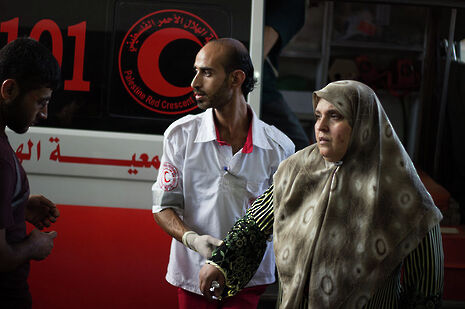Israel Society brands councillor’s Gaza remarks “irresponsible and cruel”
The University of Cambridge Israel Society is among multiple groups to comment on Tim Bick’s description of the conflict as “genocide”.

Last week saw the implementation of a ceasefire between the Israeli government and Palestinian militants, but here in Cambridge a city councillor’s description of the conflict as a "genocide" has sparked new controversy.
Liberal Democrat Tim Bick attracted media attention after he called for Palestinian "genocide" victims in Gaza to speak at a Holocaust memorial day.
Bick equated the Israeli Defence Forces’ actions during the 50-day conflict to a "genocide" in Gaza. Consequently Mr. Bick, a former city council leader, wrote to the organizers of next January’s Holocaust Memorial Day, asking for the victims of the recent military struggle to be included in the event.
Bick justified his comparison of the Holocaust with the Gaza-Israel conflict with the following statement: "The victims have been a whole people, already impoverished and stateless, who are marked out only by where they live, over which they have little choice, and by their ethnicity, over which they have none."
"It is not about the grand politics of the Middle East, it is about the value we put on the lives of ordinary people. I see this as a critical step to keep fresh the moral intensity of our revulsion for acts of genocide and to be clear that it is not an issue in the ownership of any one people."
The organizers of the Holocaust Memorial Day said Bick, the current councillor for Market ward, had made comparisons that were "not appropriate". A spokesman stated; "we deplore the horrors and suffering in the current conflict, but [genocide is] a crime with a clear definition, which is not applicable to the current situation in Israel and the Palestinian territories."
University of Cambridge societies have issued various statements regarding the dispute.
The Cambridge University Palestinian Society, referred to the 1948 UN definition of the term of genocide as "acts with intent to destroy, in whole or in part, a national, ethnical, racial or religious group," CUPal added that "if we look only at these most recent Israeli acts against the Gazan population we might feel they are too small, or have happened over too short a time period, to earn the name 'genocide', however (…) violent and depriving acts by Israel against Palestinians, did not begin this summer. The pattern of action – with intent to destroy Palestinian society – began in 1948."
University of Cambridge societies have also condemned Bick’s comments. Taking a more political position, Joshua Gertner, Co-President of the Cambridge University Israel Society gave Varsity the following statement: "Comparing the victims of the Holocaust to those who suffer under a terrorist organisation in Gaza is both irresponsible and cruel. All civilian casualties are tragic, so it [the comparison] is a disservice to both their memories and to democracies battling terrorism globally."
The Cambridge University Jewish Society also described Bick’s comments as representing a "new form of Holocaust revisionism".
"CUJS consists of a heterogeneous group of people with a diverse range of views, and we therefore do not take a stance on most Israel-related matters. Any loss of civilian life is tragic and we deeply empathise with the loss and grief experienced on both sides of the conflict. However, we are concerned that labelling Israeli actions with such emotive words as 'genocide' is not constructive and unhelpfully polarises a far more complex reality."
"We are further concerned that conflating the Holocaust with events in Gaza, represents a new form of Holocaust revisionism. It undermines the suffering of all of the groups represented by the Holocaust Memorial Day Trust and does no credit towards any genuine suffering that has happened in Gaza. We are therefore dismayed at this proposal to use Holocaust Memorial Day as a political platform, in a way that fails to address the core issues that underline the Israel-Palestine conflict."
During the recent Hamas-IDF fighting, 2,100 people were killed in Gaza, including 500 children. On the Israeli side, casualties totaled 64 soldiers and 6 civilians, of whom one was a 4-year old boy.
 News / Clare Hall spent over £500k opposing busway 24 December 2025
News / Clare Hall spent over £500k opposing busway 24 December 2025 Comment / The ‘class’ of Cambridge24 December 2025
Comment / The ‘class’ of Cambridge24 December 2025 News / Caius mourns its tree-mendous loss23 December 2025
News / Caius mourns its tree-mendous loss23 December 2025 Comment / Yes, I’m brown – but I have more important things to say22 December 2025
Comment / Yes, I’m brown – but I have more important things to say22 December 2025 News / Girton JCR publishes open letter expressing solidarity with Palestine25 December 2025
News / Girton JCR publishes open letter expressing solidarity with Palestine25 December 2025









